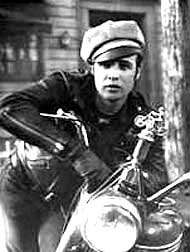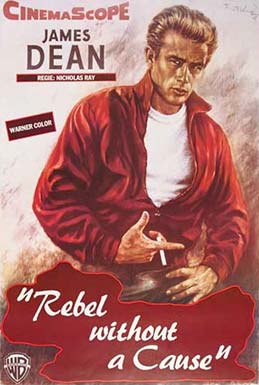Who was the fore-runner? Was it Jazz, or Blues, was it Rock'n' Roll? No, definitely not, for Rock'n'Roll grew out of the Blues. One can trace it straight down to songs like ... em ... like ... em ... well ... !!! Well, you're not really a music buff, are you, so why're you tryin' to get on with a story you know nothin' about? I'm not gettin' on with a story I know nothin' about, and if I know nothin' about it you know nothin' about it anyway. The only ones that really would know all about it can only be the performing artists themselves. Anythin' else is interpretation. You weren't there as little or as much as I was and all I know is from books and records and stories, tales that surround the mystics of these events. You know 'bout Elvis shakin' his hips, you know 'bout the Beatles and their pre-fame Rock'n'Roll, their Hamburg days that formed them, the history of their hair-does, 'bout Dylan movin' over from acoustic to electric music, probably THE most aggressive change if one just compares these three influences on popular music and culture in the 50s and 60s. And from there right on like a piercing arrow into the 70s and 80s non-stop. Apropos non-stop, there weren't even non-stop flights yet the way you get them nowaddays. Someone's takin' the chance tryin' out some'ing and slowly but surely either you wanna beat the previous achievement or you remain set in your tracks, hardly able to move; surely not all improvements are good improvements, and as far as music is concerned it's also a matter of taste, a matter of if something's beautiful or ugly.
I remember Mo askin' the band in which her younger son played drums why they had to pull faces like that when they were singin'. She sure was an influence on the band, like she'd probably been on the Beatles, too; the early Beatles that is. Other influences, as far as the Beatles are concerned, were of course Brian Epstein, their manager and George Martin who became their record producer, and to my mind one of the finest musicians one could have had as a producer judging from the instrumental music transcribed for the movies "A Hard Day's Night" and "Yellow Submarine". You may not agree with me, but I didn't ask that you agree with me. I like his instrumental tracks. That may have to do with a taste for classical music as well. Sorry, but I'm gettin' off the track. Lost in the mirky mists of Avalon. How'd you get from here to Avalon? Ever been to Avalon? Do I have to have been any place I quote? Maybe it's just the name of a place I picked up from a song or a book or a bit from a newspaper or magazine or may have overheard in a restaurant, in a café, on a train, on a plane, in a conversation, how would I know? I don't keep track of all the names of places I hear in my life in a little worn out notebook like you do!
But coming back to your know-nothin' ideas of Jazz and Blues, in fact they grew up similtaneously in different parts of the same country. Both were around in the 40s and 50s, even earlier than that. But those were the main periods - at least for Jazz - to become very popular. The big swing orchestras, the improvisations, long instrumental solo pieces. Rock'n'Roll wasn't like that at all. Rock'n'Roll songs were short. I can't remember a long Rock'n'Roll song - at least right this moment as I write this. Blues songs were also no long songs, they are exceptions though, like one of my favorites, "Hesitation Blues" by Rev. Gary Davis. The shortness of songs was mostly due to technical reasoning. The early 78s and the following 45s could only take up so much music. And even here the Beatles as well as Bob Dylan pressurized an industry to change their format to meet the requirements of the artist and not vica versa. Yes, it is true early Jazz pieces were also very short, I just remember some of the early recorded music by Duke Ellington. They were also called "race records"; but that had little to do with the fact that they still raced around at 78 rounds per minute (rpm).
Thanks to WWII and
the American engagement toward the second half of the war in Europe, Jazz
crossed the Atlantic Ocean first on battleships, unfortunately not on cargoboats,
when GIs took Jazz records with them to the battlegrounds. Once the germans
had been reduced to a divided shred of tears previously banned music could
be heard on the radio again, people began to live again. The Beatles were
still playin' small Liverpool venues, tryin' out different songs with different
musicians while Bob Dylan played Rock'n'Roll on his parents' piano and
Billy Holiday performed in Cologne. Parents got uptied about their kids
acting like Elvis Presley or Bill Haley, or if worse came to the worse,
Little Richard, and it wasn't long before they got uptied about the Beatles
if not about Bob Dylan singin' "The Times They Are A-Changin'". Then they
didn't get uptied about the Vietnam War until it was nearly a decade into
the conflict. Politicians ruled by fear, fear of their own incompetence,
their own mischievous deeds, their economy based on militarism and anti-communism,
of indoctrination that life in fall-out shelters was safer than any other
place on earth, and that bombs would be dropped anyplace else but on fall-out
shelters. Young people ceased to believe their peers, realized that grown
ups were as much or as little human as themselves, and that the answers
could only be found by living. By the time "Rebel
Without A Cause" hit the silver screen the Beatles were nearly ready
to go to Hamburg, Bob Dylan would be orphaned off to the Village. Just
as Marlon Brando in "The
Wild One"  had introduced
the first of a series of rebellions, the "Rebel" exposed the increasing
conflict between the pre- and the post-war-generations, between parents
and their off-spring.
had introduced
the first of a series of rebellions, the "Rebel" exposed the increasing
conflict between the pre- and the post-war-generations, between parents
and their off-spring.
